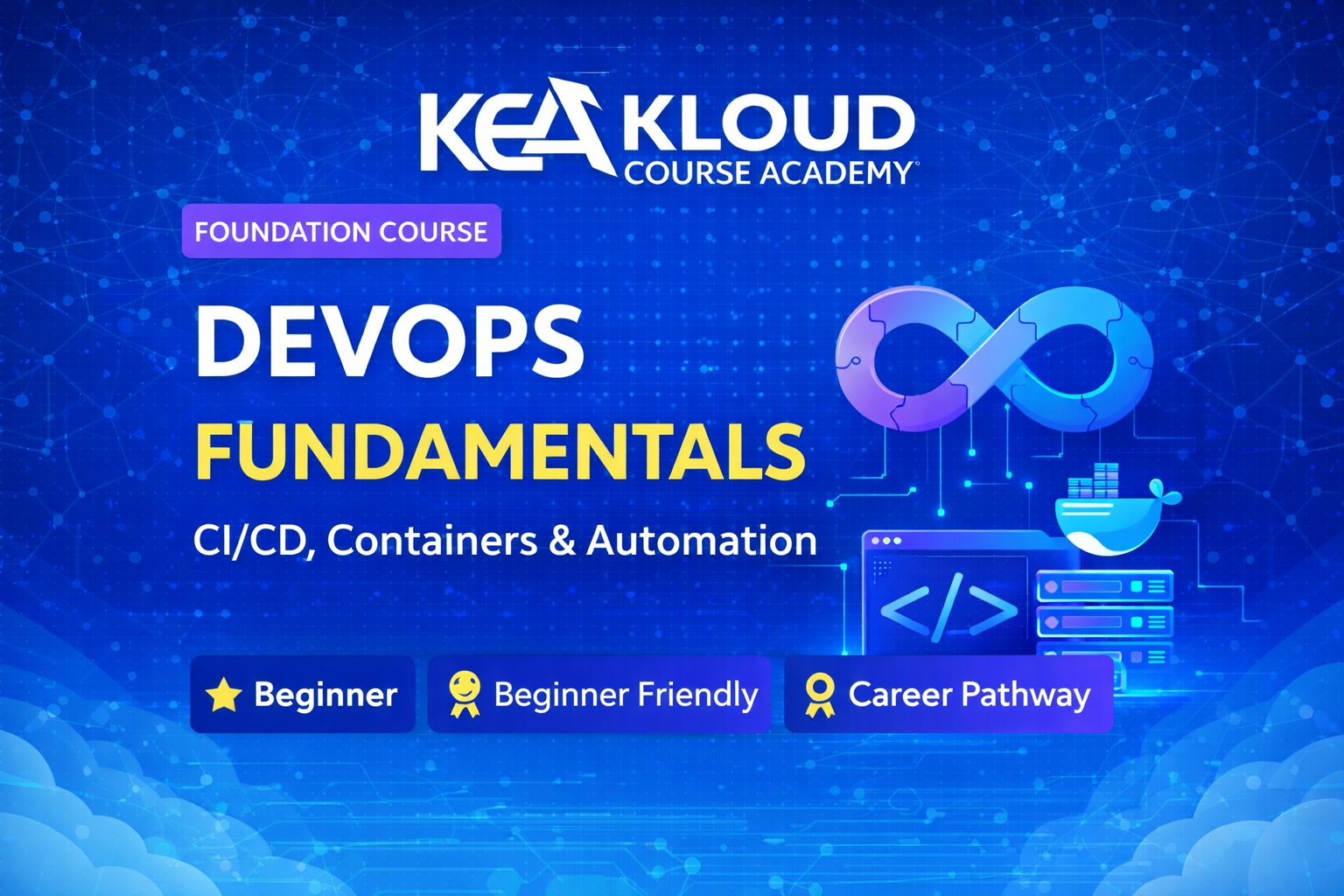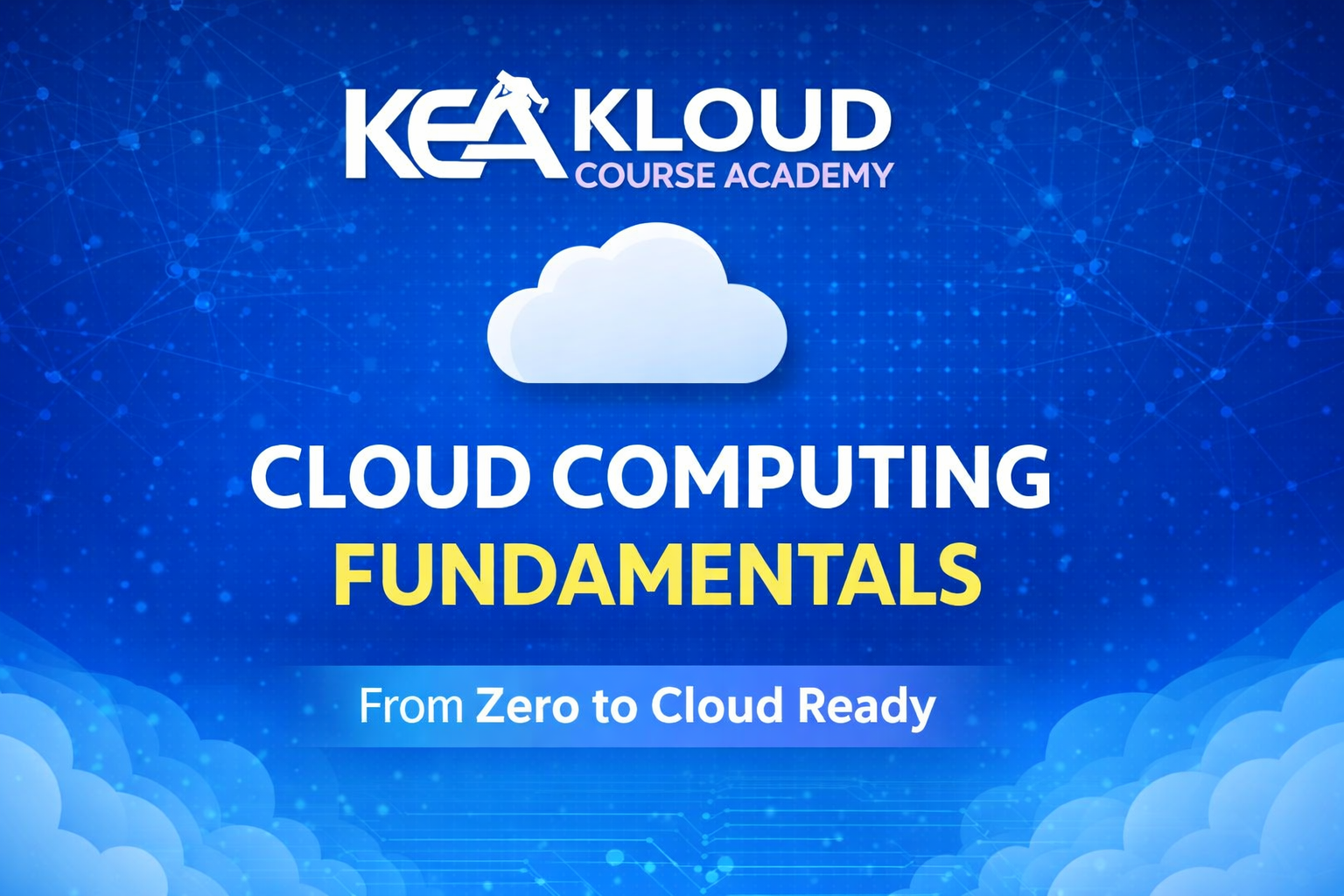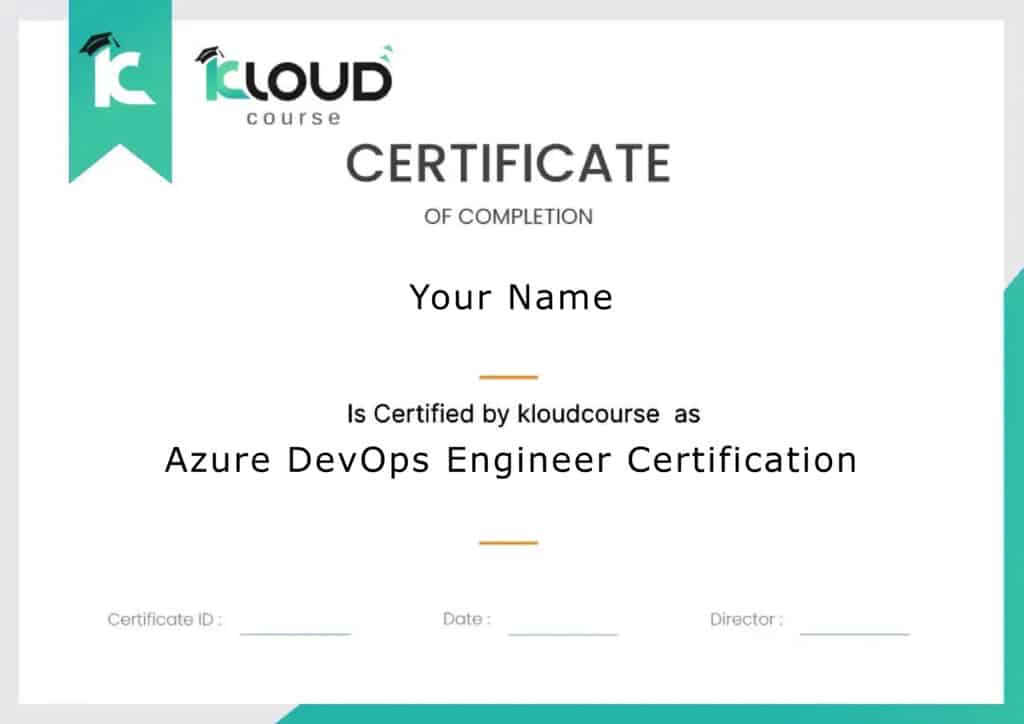Best Seller
Azure DevOps Training
+91 79933 00102
- Extensive Program with 2 Modules View all
- 56+ Hours Of Interactive Learning
- 20+ Assignments 4+ Live Projects
- Latest content, as per Microsoft Updates
This thorough Microsoft Azure DevOps Training in Hyderabad , AZ-400 course was designed by industry professionals to aid learners in becoming knowledgeable in Azure and DevOps and then utilizing those skills to execute DevOps on Azure.
You will become an expert in a variety of on-demand Azure DevOps Training in Hyderabad components during the training. This Azure DevOps training also includes a number of case studies and practical projects to make sure you can learn everything you need to know about DevOps and Azure principles.
Advance Your Career with our Online Azure DevOps Certification Training. Enrol Now!
 4.8
4.8 5.0
5.0 4.5
4.5 4.4
4.4Instructor-Led Azure DevOps Training and Certification live Online Course Schedule
Flexible batches for you
[book_batchall catid=”35″]
Why Enrol for Azure DevOps Training in Hyderabad Program?

Tech Mahindra, Netflix, Airbnb, Samsung, Nokia, BMW, Philips, and many other industry leaders worldwide use Azure DevOps for their Organization needs.

With businesses in India rapidly adopting cloud technology, there is a growing demand for skilled Azure DevOps Engineers, leading to a positive job outlook in this field.

The average salary for a Microsoft Azure Certified DevOps Engineer in India ranges from INR 9,00,000 to INR 20,00,000 per annum as per industry surveys.
Unlock Your Potential: Empower Yourself with Microsoft Azure DevOps Training Certification!
Unleash your full potential and pave the way to success with the game-changing Microsoft Azure DevOps Training in Hyderabad from Kloud Course Academy. Dive into the world of Azure DevOps and Microsoft Azure DevOps tools and harness their immense power to revolutionize your software development journey. This comprehensive Azure DevOps online training equips you with hands-on expertise in version control, continuous integration, automated deployments, and agile project management. By joining Azure DevOps online training at Kloud Course Academy’s cutting-edge program, you’ll gain a competitive edge in the tech industry and open doors to exciting career opportunities with Azure DevOps Training in Hyderabad.
Designations
Why Choose Kloud Course Academy for Azure DevOps Online Training?
Live Interactive Learning
- World-Class Certified Instructors
- Expert-Led Mentoring Sessions
- Instant doubt clearing
Access to resources
- Video Tutorials
- Practice Quizzes
- Step-by-Step Lab Guides
Post Course Support
- Learning Assistance
- Job Guidence
- Resume Building
Hands-On Projects
- Industry-Relevant Projects
- Cloud Migration Included
- Quizzes & Assignments
Azure DevOps Online Training
- KloudCourse Training Certificate
- Graded Performance Certificate
- Certificate of Completion
About your Microsoft Azure DevOps Certification for AZ-400 Training
Excel in Azure DevOps with Kloud Course Academy: Your Path to Success!
- Instrumentation Strategy
- Azure service fabric
- Security and compliance
- Azure Compute solutions
- Integrate Azure Pipelines
- Azure Functions
Azure DevOps Tools Which are Covered in this Azure DevOps Certification Course
- Azure Repos
- Azure Pipelines
- Azure Boards
- Azure Artifacts
- Azure Test Plans
- Azure pipeline
- Azure site Recovery
- Azure container services
- Azure Storage
- Azure Artifacts
- Azure Traffic Manager
- Azure Stack
- Azure IoT
- Azure Conditional Access
- Azure Diagnostics Extension
- Splunk
- Visual Studio App Center
- Zabbix
- SonarQube
- Application Insigts Funnel
- Event Grid
- Nagios
- Log Analaytics
Explore Our Top-Tier Azure DevOps Training Curriculum
Learn cloud computing fundamentals, cloud delivery models, cloud deployment models.
Learning objectives:
- Identify features and usage cases for Azure ExpressRoute.
- Coexist site-to-site and Azure ExpressRoute networks.
- Identify features and usage cases for Azure Virtual WAN.
Hands-On
- No Hands-on Sessions
Skills You Will Learn
- Cloud computing
- Cloud delivery models
- cloud deployment models
Learn how to configure Azure Monitor, including querying the Azure Monitor activity log.
Learning objectives:
- Overview of Microsoft Azure
- Explains on Azure Platform
- Explain on Azure Resource Manager
- Tour of the Azure Portal
- Manage Azure using Azure Portal
- Manage Azure using PowerShell
- Understanding on Management Services
- Explain on Azure services
- Azure Free Account creation
- Resources and Resource Groups
- Datacenters/Azure regions
- Pricing, Limitations and Quotas
Hands-On
- Design secure VPC architectures with security components.
- Determine network segmentation strategies using public and private subnets.
- Integrate AWS services for application security, including AWS Shield, AWS WAF, AWS SSO, and AWS Secrets Manager.
- Secure external network connections to and from the AWS Cloud using VPN and AWS Direct Connect.
Skills You Will Learn
- Understanding the features and use cases of Azure Monitor.
- Configuring and interpreting metrics and logs in Azure Monitor.
- Familiarity with the components and data types in Azure Monitor.
- Configuring the Azure Monitor activity log for monitoring and auditing.
Learn how to configure Azure Monitor, including querying the Azure Monitor activity log.
Learning objectives:
- The Virtual Machine Service
- Deploying a virtual machine
- Building a Windows virtual machine
- Connecting to the Virtual Machine
- Build a Linux Virtual Machine
- Azure HA – Availability Sets and Availability Zones
- Use case scenario – Availability sets
- Azure Virtual Machines – Data Disks
- Azure Load Balancers – Overview
- Virtual Network – Overview
- Azure Storage Account Understanding and Deployment
Hands-On
- Align AWS technologies for compliance requirements.
- Encrypt data at rest using AWS KMS.
- Encrypt data in transit using ACM with TLS.
- Implement access policies for encryption keys.
- Set up data backups and replications.
- Implement policies for data access, lifecycle, and protection.
- Rotate encryption keys and renew certificates.
Skills You Will Learn
- Understanding the features and use cases of Azure Monitor.
- Configuring and interpreting metrics and logs in Azure Monitor.
- Familiarity with the components and data types in Azure Monitor.
- Configuring the Azure Monitor activity log for monitoring and auditing.
Learn how to configure Azure Monitor, including querying the Azure Monitor activity log.
Learning objectives:
- Overview of App Service
- Deployment in App Service
- Deploy and maintaining web apps
- Configuring web apps
- Azure Web App – Deployment Slots
- Function Apps – Micro Service – Overview
- Azure Kubernetes Services
Hands-On
- Design event-driven, microservice, and/or multi-tier architectures.
- Determine scaling strategies for architecture components.
- Identify AWS services for achieving loose coupling.
- Decide when to use containers.
- Decide when to use serverless technologies and patterns.
- Designing VPC architectures with public and private subnets
- Recommend suitable computing, storage, networking, and database technologies.
- Utilize purpose-built AWS services for specific workloads.
Skills You Will Learn
- Understanding the features and use cases of Azure Monitor.
- Configuring and interpreting metrics and logs in Azure Monitor.
- Familiarity with the components and data types in Azure Monitor.
- Configuring the Azure Monitor activity log for monitoring and auditing.
Learn how to configure Azure Monitor, including querying the Azure Monitor activity log.
Learning objectives:
- Azure Cloud Shell
- Azure PowerShell and Azure CLI
- ARM Templates – for Storage Account
- ARM Templates – parameters
- Overview on Terraform
- Deployment of Resources through Terraform
Hands-On
- Determine automation strategies for infrastructure integrity.
- Identify AWS services for highly available and fault-tolerant architectures.
- Define metrics for delivering a highly available solution.
- Implement designs to mitigate single points of failure.
- Ensure data durability and availability through backup strategies.
- Select an appropriate disaster recovery (DR) strategy.
- Enhance reliability of legacy and non-cloud-native applications using AWS services.
- Utilize purpose-built AWS services for specific workloads.
Skills You Will Learn
- Understanding the features and use cases of Azure Monitor.
- Configuring and interpreting metrics and logs in Azure Monitor.
- Familiarity with the components and data types in Azure Monitor.
- Configuring the Azure Monitor activity log for monitoring and auditing.
Learn how to configure Azure Monitor, including querying the Azure Monitor activity log.
Learning objectives:
- What is the Azure Monitor service?
- Working with Azure Monitor
- What is Azure Log Analytics
- Application Insights
- Container Insights
Hands-On
- Determine storage services and configurations for meeting performance demands.
- Identify storage services that can scale to accommodate future needs
Skills You Will Learn
- Understanding the features and use cases of Azure Monitor.
- Configuring and interpreting metrics and logs in Azure Monitor.
- Familiarity with the components and data types in Azure Monitor.
- Configuring the Azure Monitor activity log for monitoring and auditing.
Learn how to configure Azure Monitor, including querying the Azure Monitor activity log.
Learning objectives:
- Introduction to Azure DevOps
- Overview of ADO Boards
- Create ADO Account
- Roles and Responsibilities in ADO
- Project management using ADO
- Methodologies in ADO (SCRUM, AGILE, CMMI)
- Scrum Methodology
- Create PBI (Product Backlog Item) and Sprints
Hands-On
- Decouple workloads for independent scaling of components.
- Identify metrics and conditions for scaling actions.
- Select appropriate compute options (e.g., EC2 instance types) based on business requirements.
- Choose the right resource type and size (e.g., Lambda memory) to meet business needs.
Skills You Will Learn
- Understanding the features and use cases of Azure Monitor.
- Configuring and interpreting metrics and logs in Azure Monitor.
- Familiarity with the components and data types in Azure Monitor.
- Configuring the Azure Monitor activity log for monitoring and auditing.
Learn how to configure Azure Monitor, including querying the Azure Monitor activity log.
Learning objectives:
- Understanding on Git VCS and Commands
- Creation of Azure Git Repository and GitHub Repository
- Branching Strategy
- Create the Own Branches based on the developer requirement
- Import Repository from Outside of the ADO to IDE
- Creating Pull Requests and Accepting Pull Requests
- Working with Visual Studio Code for pull and push the code
Hands-On
- Configure read replicas to meet business requirements.
- Design database architectures.
- Determine appropriate database engine options (e.g., MySQL, PostgreSQL).
- Determine appropriate database types (e.g., Amazon Aurora, Amazon DynamoDB).
- Integrate caching to meet business requirements.
Skills You Will Learn
- Understanding the features and use cases of Azure Monitor.
- Configuring and interpreting metrics and logs in Azure Monitor.
- Familiarity with the components and data types in Azure Monitor.
- Configuring the Azure Monitor activity log for monitoring and auditing.
Learn how to configure Azure Monitor, including querying the Azure Monitor activity log.
Learning objectives:
- Understanding on CI pipeline
- Create the CI Pipeline for Different Ways
- Infrastructure deployment pipelines using Azure PowerShell, ARM Templates and Terraform Scripts
- Application Deployment using Build Setup
- Authenticate ADO to Azure through Service Connections
- Continues Integration Setup
- Lab — Azure CI Pipelines for Infrastructure deployments – Using ARM Templates
- Lab – Azure CI Pipeline for Infrastructure deployment using PowerShell
- Lab – Azure CI Pipeline for Infrastructure deployment using Terraform
- Build a Docker Image and push to Azure Container Registry
- Build Application using Build tool in CI pipeline (MS Build tool)
Hands-On
- Utilize edge networking services (e.g., Amazon CloudFront, AWS Global Accelerator) for specific use cases.
- Design network architecture, including subnet tiers, routing, and IP addressing.
- Understand load balancing concepts, particularly Application Load Balancer.
- Explore network connection options (e.g., AWS VPN, Direct Connect, AWS PrivateLink).
Skills You Will Learn
- Understanding the features and use cases of Azure Monitor.
- Configuring and interpreting metrics and logs in Azure Monitor.
- Familiarity with the components and data types in Azure Monitor.
- Configuring the Azure Monitor activity log for monitoring and auditing.
Learn how to configure Azure Monitor, including querying the Azure Monitor activity log.
Learning objectives:
- Understanding on Continuous Delivery/Deployment Pipeline
- Azure Release Pipelines – Azure Web App
- Azure Release Pipelines – AKS (Azure Kubernetes Services)
- Lab – Azure Release Pipelines – Multiple Stages
- Review of Release Pipelines
- Lab – Azure Release Pipelines – Using ARM Templates – Azure Web App
- Lab – Azure Pipeline for Infrastructure deployment using PowerShell
- Lab – Azure Release Pipelines – Approvals
- Lab – Azure Release Pipelines – Gates – Setup
- Infrastructure Deployment through Terraform – Overview
Hands-On
- Build and secure data lakes.
- Design data streaming architectures.
- Create data transfer solutions.
- Implement visualization strategies.
- Utilize appropriate compute options, like Amazon EMR, for data processing.
- Configure optimal data ingestion setups.
- Transform data between different formats, such as .csv to .parquet.
Skills You Will Learn
- Understanding the features and use cases of Azure Monitor.
- Configuring and interpreting metrics and logs in Azure Monitor.
- Familiarity with the components and data types in Azure Monitor.
- Configuring the Azure Monitor activity log for monitoring and auditing.
Learn how to configure Azure Monitor, including querying the Azure Monitor activity log.
Learning objectives:
- GitHub Repository Overview
- GitHub Clone to local and work with IDE VS Code
- Infrastructure Deployments using GitHub Actions
Hands-On
- Design storage strategies considering batch and individual uploads to Amazon S3.
- Determine workload-specific storage size requirements
- Identify cost-effective data transfer methods to AWS storage.
- Implement storage auto scaling when necessary.
- Manage S3 object lifecycles effectively.
- Select appropriate backup and archival solutions.
- Migrate data to storage services using the right tools.
- Choose the suitable storage tier for workloads.
- Define optimal data lifecycle strategies for storage.
- Select cost-effective storage services for specific workloads.
Skills You Will Learn
- Understanding the features and use cases of Azure Monitor.
- Configuring and interpreting metrics and logs in Azure Monitor.
- Familiarity with the components and data types in Azure Monitor.
- Configuring the Azure Monitor activity log for monitoring and auditing.
Learn how to configure Azure Monitor, including querying the Azure Monitor activity log.
Learning objectives:
- GitHub Repository Overview
- GitHub Clone to local and work with IDE VS Code
- Infrastructure Deployments using GitHub Actions
Hands-On
- Determine load balancing strategies (e.g., Application Load Balancer, Network Load Balancer, Gateway Load Balancer).
- Identify scaling methods for elastic workloads (e.g., horizontal, vertical, EC2 hibernation).
- Select cost-effective compute services for specific use cases (e.g., Lambda, Amazon EC2, Fargate).
- Determine availability requirements for different workload types (e.g., production, non-production).
- Select the appropriate instance family and size for workloads.
Skills You Will Learn
- Understanding the features and use cases of Azure Monitor.
- Configuring and interpreting metrics and logs in Azure Monitor.
- Familiarity with the components and data types in Azure Monitor.
- Configuring the Azure Monitor activity log for monitoring and auditing.
Learn how to configure Azure Monitor, including querying the Azure Monitor activity log.
Learning objectives:
- Designing appropriate backup and retention policies (for example, snapshot frequency)
- Determining an appropriate database engine (for example, MySQL compared with PostgreSQL)
- Determining cost-effective AWS database services with appropriate use cases (for example,DynamoDB compared with Amazon RDS, serverless)
- Determining the required availability for different classes of workloads (for example, production workloads, non-production workloads)
- Determining cost-effective AWS database types (for example, time series format, columnar format)
- Migrating database schemas and data to different locations and/or different database engines
Hands-On
- Design backup and retention policies, including snapshot frequency.
- Select the appropriate database engine (e.g., MySQL, PostgreSQL).
- Choose cost-effective AWS database services for specific use cases (e.g., DynamoDB, Amazon RDS, serverless).
- Determine cost-effective database types (e.g., time series, columnar).
- Perform database schema and data migration across locations or engines.
Skills You Will Learn
- Understanding the features and use cases of Azure Monitor.
- Configuring and interpreting metrics and logs in Azure Monitor.
- Familiarity with the components and data types in Azure Monitor.
- Configuring the Azure Monitor activity log for monitoring and auditing.
Empower Your DevOps Journey with our Azure Devops Training
Microsoft Azure DevOps online training is a specialized program aimed at providing individuals and teams with the necessary knowledge and skills to utilize Microsoft’s Azure DevOps online training tools proficiently. Participants learn about version control, continuous integration, continuous deployment, agile project management, and more. The training equips learners to optimize their software development processes and collaborate effectively in a DevOps environment.
This Azure DevOps AZ-400 Certification course will cover essential topics related to Azure DevOps, providing in-depth insights into version control, continuous integration, and agile project management. Participants will gain hands-on experience with Azure DevOps tools, enabling them to streamline software development, collaboration, and delivery processes effectively.
This Azure DevOps Certification Training course is ideal for software developers, DevOps engineers, project managers, and IT professionals seeking to enhance their proficiency in Azure DevOps tools and practices. Whether you’re a beginner or an experienced professional, this course offers valuable insights and skills to advance your career Azure DevOps online training in modern software development and collaboration.
The primary goals of this Azure DevOps Training course are to equip participants with a deep understanding of Azure DevOps tools and methodologies, enabling them to efficiently manage version control, automate CI/CD pipelines, and enhance project management in a DevOps environment. By the end of the course, attendees will be well-prepared to implement modern software development practices, fostering collaboration and delivering high-quality solutions using Azure DevOps.
Anyone interested in mastering Azure DevOps tools and practices can enrol in the Microsoft Azure DevOps training at Kloud Course Academy. Whether you’re a software developer, IT professional, project manager, or a DevOps enthusiast, this course is designed to cater to individuals seeking to enhance their skills and proficiency in Azure DevOps.
Please get in touch with us for Azure DevOps classroom sessions.
- In this Azure DevOps Certification Course, you can expect a comprehensive curriculum covering Azure DevOps tools and methodologies.
- Hands-on experience in version control, continuous integration, automated testing, and agile project management using Azure DevOps.
- By the end of the course, you will be well-prepared to obtain Azure DevOps certification and confidently apply your skills in real-world software development projects.
To enroll in this Microsoft Azure Certified DevOps training program, you need a basic understanding of software development concepts and familiarity with version control systems. No prior experience with Azure DevOps tools is required, making it accessible to both beginners and experienced professionals looking to enhance their skills in Azure DevOps practices.
Yes, Microsoft Azure DevOps Certification is definitely worth it. It validates your expertise in Azure DevOps tools and practices, making you more marketable and sought after in the tech industry. The certification can open up new career opportunities and demonstrate your proficiency in modern software development and collaboration using Azure DevOps.
The price of an Azure DevOps certification can vary depending on the type of certification and the region you are in. Generally, the cost ranges from $99 to $165 USD for the Microsoft Certified: Azure DevOps Engineer Expert certification exam.
This Azure DevOps certification course lasts 54 hours of live instructor-led Azure DevOps online training and classroom sessions.
Elevate your professional journey with our Azure DevOps Training and Certification projects.

Infrastructure Deployments Through Azure CI-CD Pipelines

.NET code deployment into Azure webapps

Docker Build

.NET docker container deployment on Azure WebApps
Take Pride in your Accomplishments with our Microsoft Azure DevOps Certification Training
Microsoft Azure DevOps Certification can significantly benefit your career by showcasing your expertise in Azure DevOps tools and methodologies, making you more desirable to employers and opening up opportunities in the ever-growing field of DevOps.
Azure DevOps certification comes in two main categories:
- Microsoft Certified: Azure DevOps Engineer Expert: Validates advanced skills in implementing DevOps practices using Azure DevOps tools.
- Microsoft Certified: Azure DevOps Engineer Associate: Demonstrates proficiency in deploying, configuring, and managing Azure DevOps services.
The time required to prepare for the Azure DevOps Certification varies depending on individual experience and background with Azure DevOps, but typically, it takes several weeks of dedicated study and practice to be well-prepared for the Azure DevOps certification exam.
Jobs in software development, DevOps engineering, and project management benefit most from obtaining an Azure DevOps certification, as it demonstrates expertise in modern software development practices and collaboration using Azure DevOps tools.
Yes, you can take the Azure DevOps Certification exam online from the comfort of your own space; there’s no need to visit a physical testing centre as it is a remote-proctored exam.
Microsoft Azure offers it to professionals who can demonstrate their skill and knowledge by passing the Microsoft Certified: DevOps Engineer Expert exam.
Beginners can start their learning in Azure DevOps by enrolling in the Azure DevOps course offered by Kloud Course Academy, which provides a structured and comprehensive introduction to Azure DevOps tools and practices.
A career in DevOps can be a rewarding choice, especially with the growing demand for professionals skilled in Azure DevOps and the opportunity to contribute to streamlined software development and collaboration processes.
Microsoft Azure DevOps certification exams are available in multiple languages, including English, Japanese, Chinese (Simplified), Korean, German, Spanish, French, Portuguese (Brazil), and Russian.
There are no specific prerequisites for enrolling in the Microsoft Azure DevOps Certification Training program. However, having a basic understanding of software development concepts and familiarity with version control systems can be beneficial for better comprehension of the course material and exam topics.
Discover the testimonials from our students about the quality and impact of our Azure DevOps Certification






Like what you hear from our learners?
Microsoft Azure DevOps Certification FAQ’s
Microsoft Azure DevOps is a cloud-based collaboration platform that provides tools and services for software development, version control, continuous integration, continuous deployment, and project management.
Microsoft Azure DevOps includes several tools, such as Azure Repos for version control, Azure Pipelines for continuous integration and continuous deployment (CI/CD), Azure Boards for agile project management, and Azure Artifacts for package management.
The duration of the Azure DevOps Certification exam typically ranges from 120 to 150 minutes, depending on the specific certification level.
The Azure DevOps Certification is valid for two years from the date of passing the certification exam.
Yes, before enrolling in the Azure DevOps Training at Kloud Course Academy, you may have the option to attend a demo session to get a preview of the course content and teaching style.
Yes, if you do not pass the Microsoft Azure DevOps Certification exam on your first attempt, you can retake the exam after waiting for 24 hours. There is no limit to the number of retakes you can attempt in a year.
Kloud Course Academy may offer job assistance or placement support to participants who complete their Azure DevOps training to help them in their career search within the tech industry.
Yes, at Kloud Course Academy, you will receive academic support as you learn Azure DevOps, which may include access to instructors or mentors for guidance and clarification during your training journey.
The difficulty level of passing the Azure DevOps exam depends on an individual’s preparation, knowledge, and experience with Azure DevOps tools and practices. With proper study and hands-on practice, many candidates find success in passing the exam and obtaining the Azure DevOps certification.
A certification that attests to your familiarity with DevOps or Agile working practices, as well as the cloud, can improve your chances of landing a job and receiving a competitive salary. A junior Azure DevOps Engineer receives an average pay of $125,000, according to Nigelfrank, Microsoft’s recruitment firm, while senior and mid-level engineers make an average compensation of $185,000 and $145,000, respectively. Now is the time to obtain your Azure DevOps engineer certification if you want to pursue a career in this area.
If you miss a live class in Microsoft Azure DevOps Training at Kloud Course Academy, you may have access to recorded sessions or course materials, allowing you to catch up on the missed content at your convenience.
If you still have questions after finishing the Azure DevOps training at Kloud Course Academy, you can reach out to the instructors or support team for additional assistance. They are available to provide further guidance and clarify any doubts to ensure your understanding of Azure DevOps concepts and practices.











